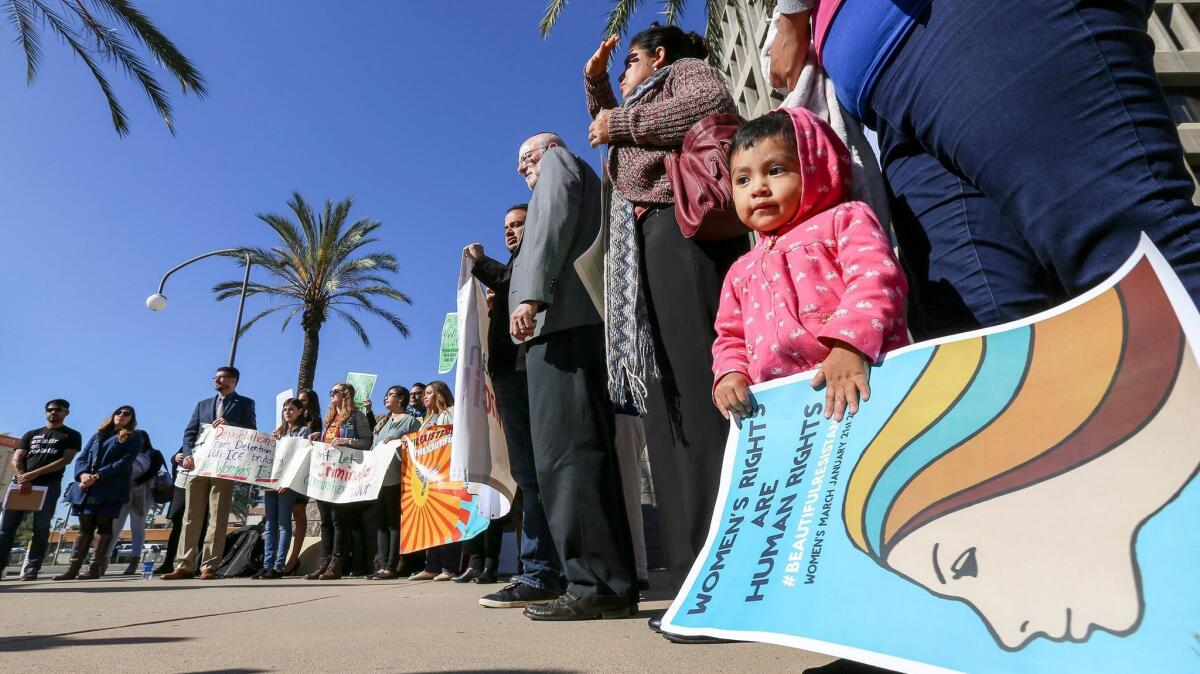Santa Ana criticized for cutting funding for immigration rights program while increasing police spending

- Share via
Undocumented Santa Ana residents may have more difficulty fighting deportation if the City Council doesn’t approve more funding for its critical deportation defense fund next week.
The program, which was started in 2017, allows Santa Ana residents facing potential deportation to secure an attorney. The residents who qualify for the program wouldn’t otherwise be able to afford legal counsel.
“We realized that many of our neighbors and residents are undocumented and facing deportation, and the vast majority of them don’t have the benefit of being able to retain an attorney,” said Councilman Vicente Sarmiento. “This allows them to have somebody there in their defense to ensure that due process is being followed and those folks have a right to explain the underlying reasons why they feel that they are right to stay in our community.”
On June 18, the City Council approved $100,000 for the fund, half of its budget for the prior year. During that meeting, the council also approved a controversial $9-million boost to the police department despite public uproar over the increase. A movement to defund police departments around the country has taken hold since the death of George Floyd involving Minneapolis Police Officer Derek Chauvin.
Sarmiento voted against that initial approval of the city’s budget. A second reading of the budget will be held on July 7, when the council could choose to allocate more money to the deportation fund.
Mayor Miguel Pulido, who voted in favor of the city budget, said he supports the deportation defense fund, but doesn’t know if he will vote to increase its funding next week due to the pandemic’s financial impact on the city.
“I want to talk to the city manager and get her picture of the overall budget,” Pulido said. “Because of the pandemic even things we commit to right now we may not be able to carry out. We don’t know what is going to happen yet.”
Pulido said he voted for the increase in police spending because the department will use the funds to attract quality officers, who are needed. He said the city has 1.01 officers for every thousand residents, which is low compared to other cities like Los Angeles, which has about 2.9 officers for every thousand residents.
“Mainly, it’s to remain competitive,” Pulido said. “What I mean by that is we have a very lean police department...If you get extremely low, it’s very difficult to have good response times. If somebody calls because they need help and you want to send a call out for service and you don’t have enough officers, you can’t do it.”
Joyce Noche, legal services director for the Immigrant Defenders Law Center, views the police spending increase differently.
“It seems there is going to be more enforcement and less access to counsel,” Noche said. “That’s problematic ... What you see as part of police enforcement is the criminalization of immigration. These efforts of raising the budget of the police while decreasing a budget like ours, which is already quite modest, is unfortunate, and I think it doesn’t really speak to the need for resources like ours for Santa Ana residents.”
Santa Ana is the only city in Orange County to set aside public funds for the legal defense of immigrant residents facing deportation. The fund is part of the Safety and Fairness for Everyone Network, which is in about 18 jurisdictions. Long Beach and Los Angeles city and county are the only other places in Southern California with legal defense funds.
The Immigrant Defenders Law Center has been the contracted recipient of the Santa Ana fund since its inception.
Sarmiento has supported the program since the beginning, and he’s called for the council to consider allocating the full $200,000. He and other proponents of the fund argue that the extra $100,000 is minuscule compared to the city’s general fund budget of $326 million.
“Folks need to understand this is also something that has to do with economic development and continued success in our community, because once one the wage earner or salary earner in a family is removed and separated from their home, usually that family suffers economic consequences,” Sarmiento said.
“They have one less salary and there is less commerce being conducted. Kids aren’t going to school out of fear of being separated from their parents. People are just having a difficult time going about their daily lives. We realize these are extremely devastating to not only the individual’s family but also has impacts and reverberates throughout the community.”
Noche said it likely costs more than $6,500 for each case. The law center has represented 37 clients so far, and another 35 children who are the family members of the clients.
“It’s not OK that this project is losing funding while Santa Ana city police is gaining $9 million in funding,” said Faby Jacome, a founding board member for the Orange County Justice Fund. “In a $9-million budget increase, $100,000 dollars is a drop in the bucket.”
Faby said some of the money currently earmarked for the police could be put toward the deportation fund, as well as mental health services for the children of people who are detained and deported, who suffer trauma and PTSD.
“The last thing we need is more police,” Jacome said.
Public comments can be submitted to the council by emailing eComment@santa-ana.org. The meeting, slated for 5 p.m., can be viewed at santa-ana.org/cc/city-meetings.
All the latest on Orange County from Orange County.
Get our free TimesOC newsletter.
You may occasionally receive promotional content from the Daily Pilot.




